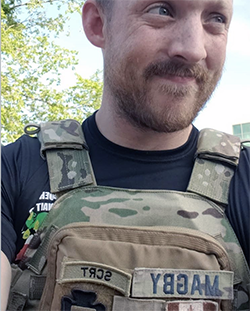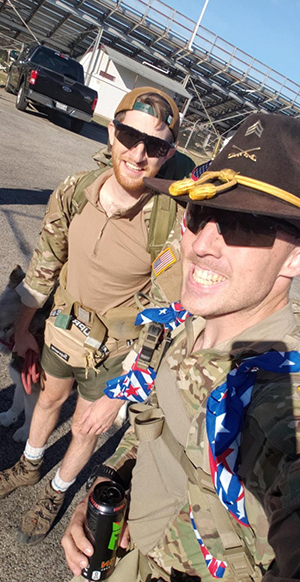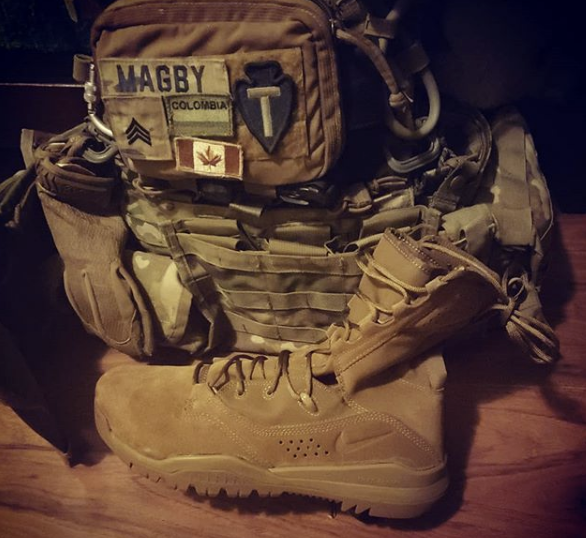Story by Charles E. Spirtos, Texas Military Department Public Affairs
 Sgt. Magby training. (Courtesy Photo: Sgt. Benjamin Magby)
Sgt. Magby training. (Courtesy Photo: Sgt. Benjamin Magby)
Sgt. Benjamin Magby, Alpha Troop, 1st Squadron, 124th Cavalry Regiment, is no stranger to fitness. As a calvary scout in the Texas Army National Guard, he also maintains status as a competitive powerlifter with a deadlift max of 515 lbs. and a total max of 1,200 lbs. This lifestyle requires a strict regimen of physical fitness and allows him to maintain his peak performance both as a powerlifter and as a warrior in the Texas Army National Guard.
Magby likens the structure and format of powerlifting to the sort of fitness requirements that a well-prepared Soldier must maintain. He believes that his career as a powerlifter prepares him for the battlefield.
 Sgt. Magby completing "The Murph Challenge", a CrossFit workout in honor of the late Navy LT and Medal of Honor recipient Michael P. Murphy. Participants in the Murph Challenge are encouraged to complete the workout while wearing 20-pound armor plates. (Courtesy Photo: Sgt. Benjamin Magby)
Sgt. Magby completing "The Murph Challenge", a CrossFit workout in honor of the late Navy LT and Medal of Honor recipient Michael P. Murphy. Participants in the Murph Challenge are encouraged to complete the workout while wearing 20-pound armor plates. (Courtesy Photo: Sgt. Benjamin Magby)
“In powerlifting, one does not win simply by mere strength alone,” said Magby.
While the amount of weight lifted is certainly a key factor, proper form and execution is equally essential. The synergy of power and form as seen in powerlifting has a direct parallel to resiliency and lethality on the battlefield, as exemplified by the fact that in combat, a Soldier must employ proper technique in tandem with force.
Magby takes great pride in operating at a peak level of physical fitness. When asked for his motivation to maintain physical wellness, Magby responds that being in the best possible physical shape directly correlates with the Army value of duty.
“It’s my duty and responsibility to maintain the standard required of a Soldier to perform on the battlefield,” said Magby.
As a non-commissioned officer and leader, he believes it’s his duty to lead by example and model to his Soldiers what the expectations of physical fitness are and what steps are required to reach and exceed those expectations.
In order to serve as a role model for his fellow Soldiers, Magby constantly looks for new challenges to conquer. In November, he participated in a charity ruck march to support the Texas Airborne Alliance during which he rucked 42 miles in 24 hours.
“It was one of the most physically challenging activities I have ever participated in,” Magby said.
 Sgt. Magby and Cpl. Garrett Thompson completing the "42 in 24" Ruck March in support of the Texas Airborne Alliance. (Courtesy Photo: Sgt. Benjamin Magby)
Sgt. Magby and Cpl. Garrett Thompson completing the "42 in 24" Ruck March in support of the Texas Airborne Alliance. (Courtesy Photo: Sgt. Benjamin Magby)
Despite numerous opportunities to leave the ruck march, Magby nevertheless persisted and completed the forty-two miles in stride. Having risen to the occasion, Magby exhibited superior physical fitness and led by example.
When asked about the Army Combat Fitness Test, Magby expressed excitement for the Army’s evolution in assessing Soldiers’ holistic wellness. He believes these changes to the Army physical fitness program will result in fewer battlefield injuries and a force that exhibits increased resiliency and agility.
“You are not going to be able to walk in one day and max [the ACFT] out,” said Magby. “But with continuous conditioning, every Soldier will be able to succeed.”
Magby looks forward to the ACFT becoming the official Army fitness test of record because the complex motions required for each event remind him of powerlifting and also have direct parallels to activities that a Soldier may need to perform in combat.
In discussing the importance of a holistic wellness program, Magby acknowledges the importance of emotional and spiritual health in maintaining peak resiliency. These facets of fitness are all equally important, and spiritual health is especially significant for Magby, who is a member of the Church of Jesus Christ of Latter Day Saints. Here, he finds inspiration for personal growth in his spirituality.
His spiritual health “gets him through hard times” and centers him during periods of stress and adversity, improving his quality of life in the civilian world and as a Guardsman, as well.
 (Courtesy Photo: Sgt. Benjamin Magby)
(Courtesy Photo: Sgt. Benjamin Magby)
Magby’s holistic spiritual, physical and emotional wellness provides a system of support to ensure that he can balance the many demands he faces as a citizen-Soldier.
One does not need to be a professional powerlifter, a fitness guru or a nutrition expert to reach his or her fitness goals. By setting and meeting goals for fitness as Magby has, every member of the Texas Army National Guard can be the best citizen-Soldiers they can be.